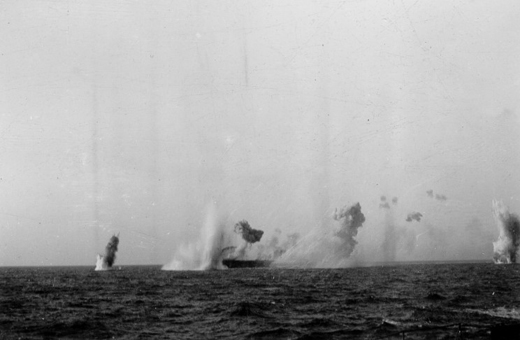Air Operations, Europe
The first large-scale RAF daylight raid over France since June 1940 occurs. 100 fighters escort Blenheim bombers in a sweep over the Pas De Calais attacking airfields and cross-Channel gun positions. There are night raids on Brest and Palermo, Sicily.
[Axis Diplomacy
Soviet-German pacts on frontiers in Eastern Europe and on trade are signed in Berlin and Moscow. One pact sees Germany renouncing her claim to the 'Suwalki Strip' of Lithuanian territory. In return the USSR will pay 31.5 million Reichmarks to Germany in compensation. By the other food and raw materials are to be exchanged for industrial equipment. The economic benefits to Germany of the agreement with the Soviet Union will continue until the very day that Operation Barbarossa begins.
[The Blitz
Portsmouth is the target. During the night 19 He-111's of KG55 drop 28 flares followed by some very heavy bombs to get the raid started. 150 aircraft drop 40,000 incendiaries along with high explosives. Damage is heavy in Portsmouth, Southsea and Gosport. Warehouses, timber yards and railways are hit, but dockyard installations suffer relatively light damage. There is a lot of damage done to houses, churches, cinemas and other commercial property. Water supplies failed and some water ends up getting pumped over 3 miles. In Southsea there is damage to shopping areas, schools, churches and 2 hospitals. 28 large fires are started for the loss of 6 planes. Casualties are put at 250 people.
[Greek-Albanian Front
The Greek forces take Klisura, 22 miles from the Greek border, after the 4 Italian divisions in that sector have been pulled back.
[Mediterranean
Off Pantelleria a British convoy of 14 merchantmen is attacked, first by 2 Italian torpedo boats, 1 of which, the Vega is sunk for no loss to the convoy, and then by 40 German Stuka and Ju-88 bombers. The carrier Illustrious is hit 6 times by dive bombers causing 200 casualties. Warspite dodges several attacks but other ships are also damaged. The cruiser Gloucester is damaged and the cruiser Southampton is hit so badly the British do not think they can recover her, so she is sunk intentionally. This is the first action by the German X Fliegerkorps. Illustrious retires to Malta. All the British forces from Gibraltar and Alexandria have been out covering convoys for Greece and Malta. More troops and 18 fighters are brought to Malta. The additional loss of a cruiser and a destroyer further aggravate the British problem. From this day Britain no longer commands the central Mediterranean. As a result the Germans are able to supply the Axis forces in North Africa with the equipment needed for the eventual drive into Egypt.
Illustrious Under Attack |
 |
Italian and German aircraft carry out heavy raids on Malta. Part of the X Fliegerkorps has been recently attached to the Italian air squadrons operating over the Mediterranean. This unit has been transferred from bases in northern Europe where it had played an important part in operations against shipping in the Norwegian campaign. As of January 1 operating from Sicily, the group comprises 96 bombers and 25 fighters. At full strength this unit will consist of 120 bombers, 150 dive-bombers, 40 fighters and 20 reconnaissance aircraft.
[United States, Policy
The U.S. issues directives requiring export licenses for the shipment of copper, brass, bronze, zinc, nickel, potash and the semimanufactured products made from those materials. This action gives Washington further control over trade with Japan.
[United States, Politics
The Lend-Lease Bill is introduced to Congress. There is considerable opposition. Among the prominent opponents of the bill are Senators Burt Wheeler and Gerald Nye, former Ambassador Joseph Kennedy and Charles Lindbergh.(see March 11).
[